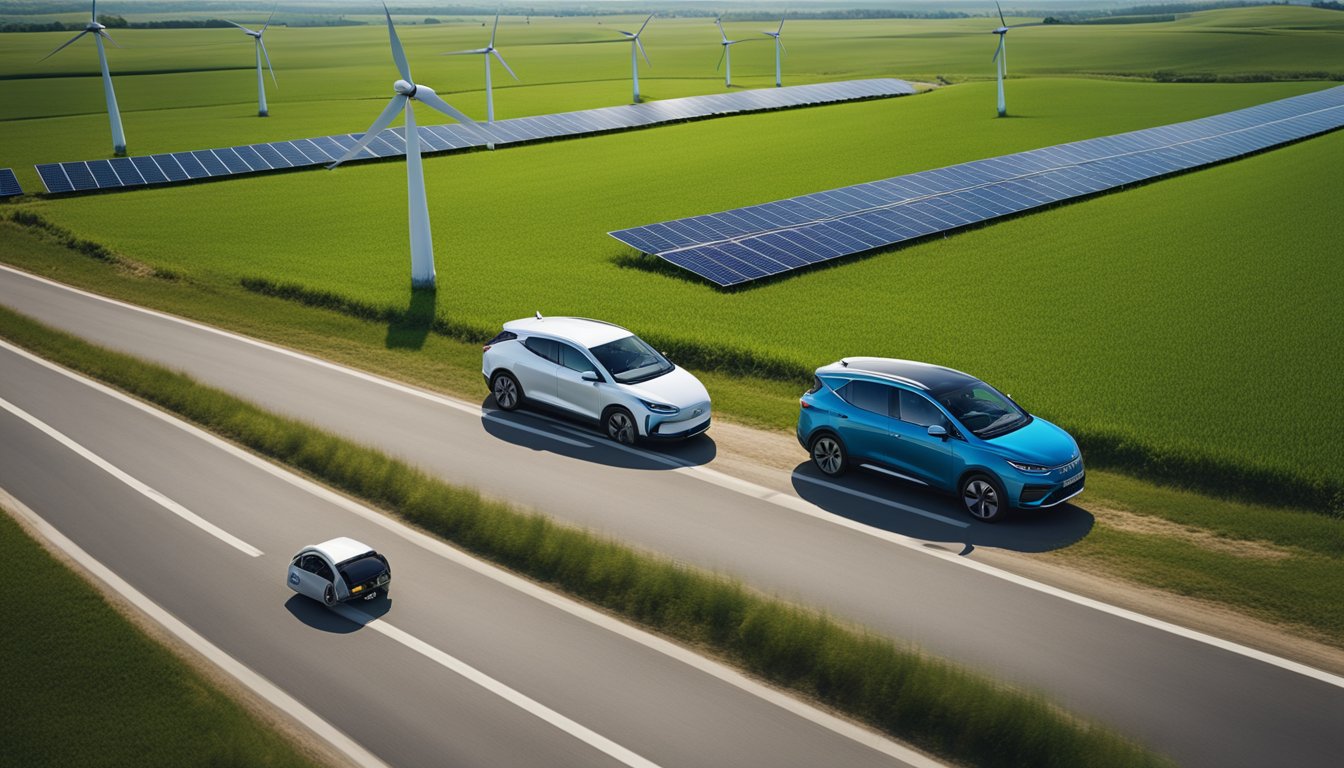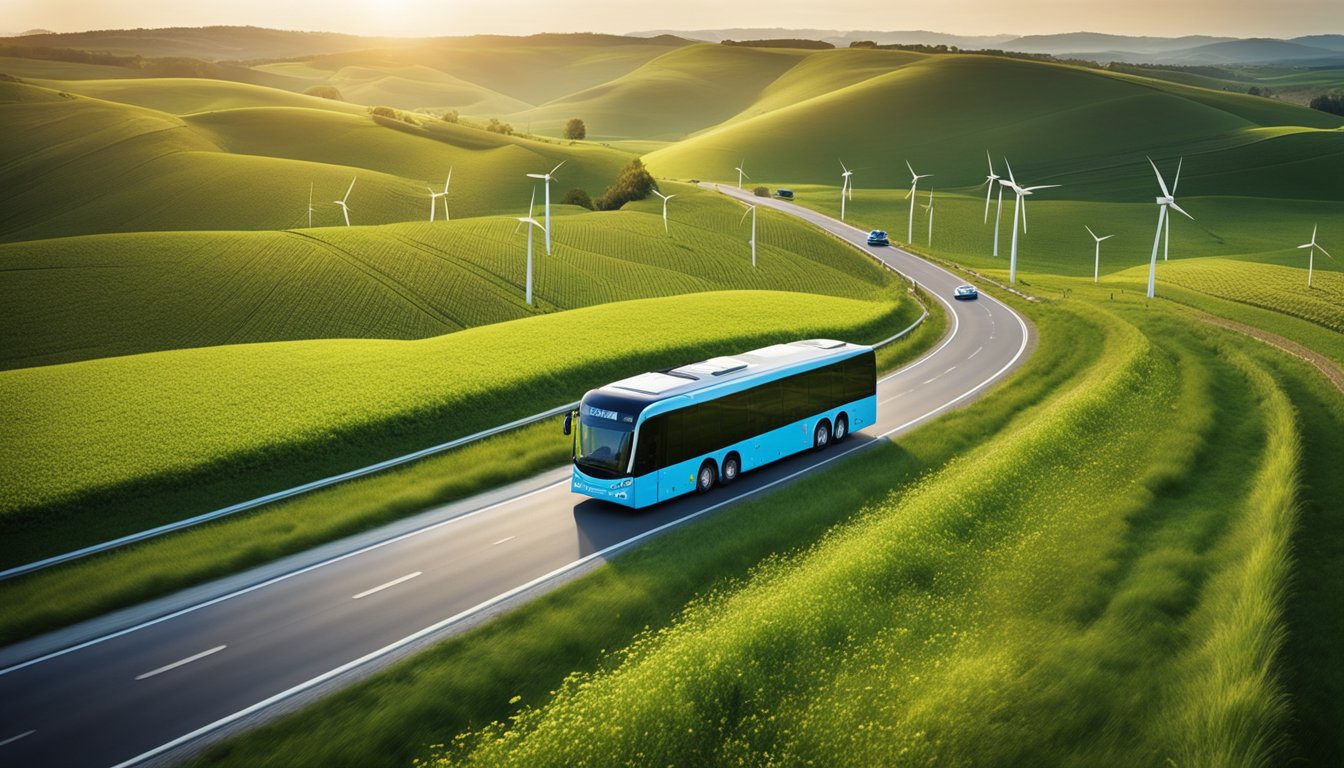Late updated: 27 Jan 2025 09:01
Written by: Oliver Bennett
Innovative Renewable Solutions For Rural UK Transportation: Transforming Connectivity and Sustainability
Rural transportation in the UK has long faced challenges, from limited access to essential services to the significant impact of carbon emissions on the environment. In recent years, leveraging renewable energy solutions has been transformative. As we explore innovative strategies, we see a promising path to overcome rural transport hurdles while enhancing sustainability and connectivity.

Investments in cutting-edge technology and infrastructure are reshaping how we approach rural mobility. With government initiatives like the £1.2 million Rural Transport Accelerator Fund, we're seeing small businesses leading the charge to create more efficient and environmentally friendly transport options. These developments have the potential to significantly improve the quality of life for those living in remote regions.
By focusing on the synergy between innovation and renewable energy, we can pave the way for a greener, more connected future. These sustainable solutions do not just promise enhanced transport systems; they also align with a broader vision of reducing emissions and combating climate change, crucial for the well-being of our planet.
Key Takeaways
- Renewable solutions are key to enhancing rural transport.
- Government funding is spurring innovative projects.
- Sustainable transport reduces emissions significantly.
Strategic Overview of Rural UK Transportation

Our exploration of rural UK transportation focuses on current mobility issues, the role of government in shaping policy, and the shift towards a sustainable future. Each of these areas plays a significant role in transforming rural transportation and enhancing the quality of life in rural communities.
Assessing the Current State of Rural Mobility
Rural transport in the UK currently faces several challenges such as limited public transport options and decreasing populations in some areas. Many rural communities rely heavily on private vehicles, which can lead to economic and environmental concerns.
The accessibility and quality of transport services vary, affecting local economies and social connections. Improved infrastructure and innovative solutions are vital to address these concerns. We must consider both the physical geography and demographic needs to create effective transport systems.
Government Policy and the Department for Transport's Role
The UK Government, through the Department for Transport, has committed to supporting rural mobility with strategic initiatives and policies. These efforts target the development of a more inclusive and robust transport network that not only improves access but also stimulates local economies.
Investment in technology and infrastructure is a key component of this strategy. By fostering partnerships and collaborations, the government aims to drive innovation tailored specifically for rural needs. Ensuring rural communities benefit equitably from transportation advancements is central to ongoing policy efforts.
Towards a Sustainable Future: The Rural Strategy
The rural strategy focuses on promoting sustainability and reducing carbon footprints while enhancing transport accessibility. This involves harnessing renewable energy sources for transportation and investing in infrastructure that supports electric and hybrid vehicles.
Projects across the UK aim to decarbonise rural transport, aligning with broader environmental goals. In addition to technological advancements, encouraging public transport use and active travel can dramatically reduce emissions. The future of rural transport depends on creating solutions that preserve environmental integrity while supporting economic growth and social inclusion.
Innovative Approaches for Enhancing Rural Transport

Our focus on enhancing rural transport involves a variety of innovative techniques that aim to make travel more sustainable, efficient, and accessible. The following approaches highlight key strategies such as leveraging funding resources, incorporating digital planning tools, embracing community-driven initiatives, and adopting cleaner transport methods.
Leveraging the Rural Transport Accelerator Fund
The Rural Transport Accelerator Fund offers significant financial support to projects aiming to improve rural mobility. With grants of up to £150,000 per project, this fund empowers diverse initiatives designed to enhance connectivity and viability in rural areas.
It supports projects that foster innovative mobility solutions, integrating them into the existing transport networks to reduce dependency on traditional car usage. These funded projects can range from infrastructural improvements to technological innovations, all aimed at making rural transport systems more efficient and sustainable.
Digital Tools and Data Insights for Better Planning
Employing digital tools and data insights plays a crucial role in modernising rural transport systems. Using these resources, we can better understand travel demand and patterns, leading to smarter planning decisions.
Digital platforms allow us to collect and analyse real-time data, providing valuable insights into rural travel behaviour. This data informs the development of integrated transport solutions that cater specifically to the needs of rural communities, optimising routes, and enhancing accessibility while ensuring road safety and reducing isolation.
Community-Led Schemes and Shared Mobility
Community-led schemes and shared mobility options have emerged as impactful solutions to rural transport challenges. These initiatives empower local communities to play a direct role in addressing their transport needs, often resulting in more effective and tailored services.
Shared mobility, including car-sharing or pooled transport, offers alternative travel options that reduce car dependency. By involving local groups, these schemes enhance accessibility and connectivity, leading to economic benefits such as the creation of rural jobs and support for local tourism while promoting greener transport options.
Adopting Electric Vehicles and Alternative Transport
Electric vehicles (EVs) and alternative transport solutions are pivotal in curbing emissions and fighting climate change. We see the introduction of EVs into rural areas as essential for creating sustainable transport networks.
With government funding and infrastructure support, rural areas can transition more smoothly to EVs, reducing carbon footprints. Simultaneously, exploring alternative transport options like bicycles or agricultural transport adaptations can further provide eco-friendly travel solutions, enhancing the wellbeing of our rural communities through cleaner air and reduced noise pollution.
By implementing these innovative approaches, we aim to transform and future-proof rural transport systems.
Frequently Asked Questions

We explore how renewable energy technologies are transforming rural transport in the UK. By focusing on solar, wind, and biofuel advancements, and with the integration of electric vehicles, we examine the impact on sustainability and infrastructure. Financial support options are also discussed.
What are the leading renewable energy technologies being deployed in rural UK transport systems?
Among the leading technologies, solar panels and wind turbines are gaining traction. Biofuels also play a crucial role, alongside the electrification of transport networks. These solutions aim to reduce emissions and enhance connectivity in rural areas.
How do solar power innovations contribute to sustainable transportation methods in rural areas?
Solar power is being utilised through solar farms and panel installations. These innovations allow for clean and efficient energy supply, powering electric vehicles and public transport systems. This reduces dependency on fossil fuels and decreases carbon emissions.
What approaches have been taken to integrate biofuels into the rural UK transportation sector?
Biofuels derived from organic materials are included in engine adaptations for vehicles. These fuels offer an alternative to traditional petrol and diesel, supporting sustainable practices with their reduced carbon footprint. Pilot projects in rural areas showcase promising results.
In what ways are wind energy advancements influencing rural transportation solutions?
Wind energy is harnessed through smaller turbines that provide power for local transport. These advancements contribute by supplying renewable energy to charging stations and public transport systems, ensuring a cleaner energy source for rural connectivity.
What funding schemes are available for rural communities looking to adopt green transport options?
The UK government and private entities offer various grants and incentives to encourage green transport. Funding schemes support infrastructure development and the implementation of renewable technologies, making it easier for rural areas to transition towards sustainable solutions.
How are electric vehicles being accommodated within rural UK transport infrastructure?
Charging stations are being expanded in rural areas to support the growing number of electric vehicles. Upgrades to existing transport networks ensure that electric vehicles are viable options, providing an effective alternative to traditional fossil-fuel-powered vehicles.
